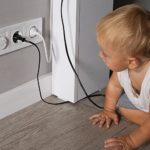It is very common for newborns to get constipated or bloated. But it is not a happy thing, on the contrary; it leaves you with an upset and crying baby. This affects both the new mum and her baby as neither get the sleep and rest they need. And we know, you need your rest and sleep to care well for your newborn baby. Therefore, here are a few solutions for newborn constipation.
How to tell that my newborn is constipated?
First of all, newborn babies’ bowel movements differ depending on whether they are breastfed or formula fed. If you are breastfeeding your baby, he or she will pass regularly once every two to three days. Some babies even poop once every seven days. Such cases are considered normal. Especially if your baby is looking comfortable, and there is no tummy bloating.
Things are different for babies who are bottle fed using formulas. Those babies usually poop at least once or twice a day. If this pattern changes, then you probably should change the formula you are using. We recommend consulting with your doctor to choose well.
Does mixed feeding really work? Know the answer here!
Remember to look for the signs
There are plenty of newborn constipation signs that new mums should keep an eye on. Such as:
- 1| Your baby is cranky and cries every time he or she passes poop.
- 2| More irritation or pain while the baby is passing.
- 3| Finding tiny drops of blood in their diapers. It is known that constipation hurts the bowls and scratches them. This causes a slight bleed that can be seen in your baby’s diaper.
- 4| If your baby does not pass within 5 to 10 days. In this case we believe you should get medical consultation.
- 5| If your baby’s tummy is bloated. You can tell so by feeling his or her tummy, if it’s harder than usual, then they are bloated for sure.
- 6| Lastly, if your baby refuses to eat.
What causes newborn constipation?
Introducing a new feeding style
Some babies get constipated when the source of their milk changes. For instance, if you switch to formula, your baby might get constipated. Especially if he or she is lactose intolerant or has other unknown allergies. In such cases, it is best to find other milk choices for your baby. In addition, switching to solids might after your toddler’s bowel movement. That happens mostly when you include foods that are low in fibers such as bananas or rice.
Should mums who aren’t breastfeeding feel guilty? Read more here.
Not getting enough liquids
Newborn babies get the hydration they need from breast milk. However, when switching to formula or solid foods they tend to need another source to keep them hydrated. Babies won’t need more than a few sips of water, so you can easily include this your baby’s diet.
Changes in the breastfeeding mum’s diet
What you eat is part of the breast milk you feed your baby. Any affects your diet has can easily move to your breastfeeding baby. So, if you eat foods that are low in fiber and cause constipation, your baby will probably feel that.
Refusing to do the deed
If a newborn baby feels pain as he is “doing the deed”, then he would probably refuse to do it again. They become afraid of the pain and choose to simply not to.
Some other medical causes
In addition to those previous causes, there are more other medical ones. Research shows that about 5% or newborn constipation happens due to those causes. For example, Hirschsprung’s Disease is one of them. This disease is mainly a birth defect, where missing nerves in the intestine cause problems with passing stool.
When should I see a doctor about my newborn’s constipation?
- – If your baby is not passing stool as regularly as he or she should.
- – In case you see tiny drops of blood in the diaper.
- – If your baby’s stool is hard and dark. Also if your baby cries when passing stool.
- – Whenever your baby refuses to eat and there is a clear drop in his or her weight.
- – In case your baby gets constipated frequently.
How to deal with newborn constipation at home?
Massaging your baby’s tummy.
Generally speaking, experts and doctors highly recommend giving your baby regular massages. They help newborn babies with constipation, gas, or colic. But make sure not to give your baby a massage if he or she is bloated. But rather use massages to prevent such issues as constipation.
As for constipated babies, we recommend helping them do little baby exercises. Like moving their tiny little legs slightly and gently as if they are cycling a bike. This helps greatly with passing both stool and gas.
Giving your baby warm baths.
Warm baths also prevent constipation. The warm water helps your baby’s bowls to relax thus avoiding constipation. We love a good warm bath followed by a nice massage for maximum protection and relaxing. This is also a great pre bedtime routine.
Watching what your baby eats.
When introducing solids to your baby, make sure to start with well mashed foods. Such as mashed peas, or plums – as they are both very high in fibers. Also, use whole wheat baby cereal rather than rice. Finally, if you are still breastfeeding, include foods high in fibers within your diet. Eat less diary to prevent your newborn baby from getting constipated as well.
Keeping your baby hydrated.
Finally, keep your baby hydrated through giving him water and fruits. Especially if you are bottle feeding your baby. As we mentioned before, your baby needs a source to stay hydrated when bottle fed. After your baby turns two months old, you can include some health and sugar free juices in his diet. Like apple juice, plum juice, or pear juice. Those fruits are not random. We picked them because they are high in sorbitol, which is a natural laxative.
Remember to always check in with your doctor to keep your baby healthy and safe!






